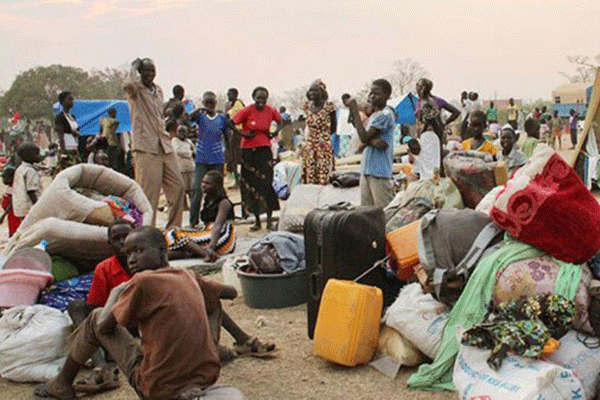Govt constructs 370 classrooms for refugee host areas

Uganda is home to over 1million refugees. PHOTO/FILE
What you need to know:
- The project will also improve roads, health, and the water sector.
Government has constructed 378 classrooms in selected secondary and primary schools in refugee host areas to improve learning.
The capacity of the schools to accommodate learners from both the refugees and host community had become a big challenge due to the huge influx of refugees.
Mr Joseph Olanyo, the project communications officer at the Prime Minister’s office, told Daily Monitor yesterday that the countrywide project was implemented by the Office of the Prime Minister (OPM) under the Development Response to Displacement Impacts Project (DRDIP) with support from the World Bank.
The project will also improve roads, health, and the water sector.
The intervention is being implemented in 15 refugee host districts of Arua, Koboko, Yumbe, Moyo, Adjumani, Obongi, Madi-Okollo and Terego in the West Nile Sub-region), Lamwo in Acholi Sub- region; Hoima, Kikuube, Kiryandongo in the Bunyoro region; Isingiro, Kyegegwa and Kamwenge in the south-western Uganda.
Some beneficiaries include Obongi Town Primary School, where four new classroom blocks, an office space and two blocks of five-stance pit-latrines have been constructed. Also, two stainless-steel water harvesting tanks, each with the capacity of 1,000 litres, have been installed at the school.
Mr Abdallah Data, the head teacher of Obongi Town Primary School, said: “With this opportunity, we are going to improve a lot on academic performance and the control of both learners and teachers will be at our advantage.”
Mr Duku Swaib, the chairperson of the health unit management committee of Lomunga Health Centre II, Gimara Sub-county in Obongi District, said the community received Shs517 million under the project to construct a maternity ward at the health centre.
The Obongi District Chief Administrative Officer, Mr Charles Ouma, said the intervention had contributed to more than 70 percent of infrastructural development.
“The quality of life has improved due to easy access to water, medical care and the roads. It (DRDIP) has really done a lot. The only problem now is that the equipment is not there. We are seeing the maternity ward as a house, we don’t know the importance of it due to lack of proper equipment,” he said.
In Kiryandongo District, at least six classroom blocks have been constructed at Kibanda Secondary School.
Mr Asirafu Mambu, the Koboko District chairperson, said the project has led to the increase in pupils’ enrolment.
“It has caused decongestion because the number of classrooms has increased. Our roads have also improved and are different from those constructed by the local government. Even when you drive, you know this road has been constructed by DRDIP,” he said.
Local leaders also acknowledged that the impact of the project is being felt in the refugee host communities.
“Before this intervention, our members of the communities were not working together. There were communities that did not listen to each other previously, but because of this common objective that DRDIP has brought, all the clans have to come in, gradually they started building that relationship… That is a positive achievement,” Koboko LC5 chairman added.
Mr Emmanuel Esaku, an engineering assistant at OPM in charge of DRDIP, told Daily Monitor that the government is proud of this project because it is trying to give them the real value for money.
“The quality of works that we have produced here you cannot find anywhere in the region. So, it is something that the government of Uganda should be proud of. Our standards are very high,” he said in an interview last week.
Challenges
Despite these efforts, much remains to be done.
The LC5 chairman of Koboko noted that inadequate funding has remained a huge challenge in the implementation of the project. Under DRDIP, Koboko receives about Shs11 billion in every financial year but the district leadership said they need at least Shs17 billion for the implementation of their planned activities.
The accounting officer of Obongi District said “while the project seems to be moving very well, the district is faced with some challenges in its implementation”.
“Somewhere somehow communities end up not agreeing with OPM policies. We are the ones here to promote OPM policies and the communities end up thinking these are our policies,” Mr Ouma explains.
At the beginning, Mr Ouma said, Community Procurement Committees (CPCs) and community project management committees (CPMCs) were formed. The CPCs thought they would take up the responsibility to do the procurement but finally when it was a little twisted, they were not happy, he added.
“They thought their responsibility had been shifted away. So, there was some resistance to transfer 70% of the monies from subproject accounts to the accounts of the partners as guided.”
Background
DRDIP is a regional project focusing on addressing the impacts of the protracted presence of refugees on the hosting communities in the four African countries, including Djibouti, Ethiopia, Kenya and Uganda.
In Uganda, DRDIP is a flagship government of Uganda project funded by the World Bank and being implemented under the Office of the Prime Minister.
Its development objective is to improve access to basic social services, expand economic opportunities and enhance environmental management for refugee host communities and settlements.


